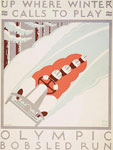The Virginia Sports Hall of Fame and Museum commemorates and honors outstanding Virginia athletes, sports journalists, coaches, and other influential sports figures. Topics addressed through exhibits include college sports, sports media, the Redskins, automobile racing, golf, the Olympics, major historical and current Virginia sports events, nutrition, and sports medicine, among other items.
The hall offers an introductory film, traditional and interactive exhibits, hands-on activities, racing simulations, educational programs which meet state standards, school educational outreach programs, teacher workshops, and Scout programs.

